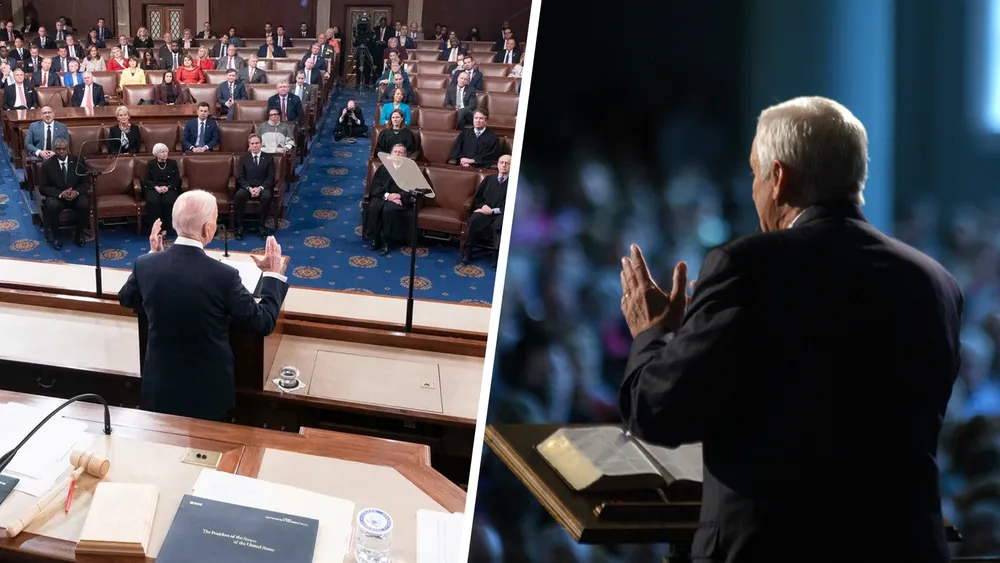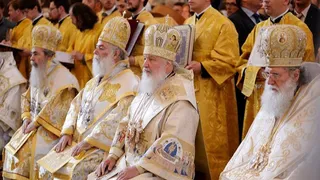Moral Majority or Moral Authority?

Recently, I taught a course on biblical law and ethics, where we explored a wide range of topics—sexuality, politics, economics, and even just war theory. A key question that emerged during our discussions was this: How do we move from theory to practice when it comes to ethics and morality? More specifically, what role should the church play in applying biblical ethics to the broader culture?
It’s one thing to study Scripture and affirm what is right and good—but once we've done that, what's next? This is where the rubber meets the road.
One historical case study that sheds light on this question is the rise of the Moral Majority in 1979. This movement offers insight into how some Christians have attempted to apply biblical principles through political action. But how effective was it? What impact did it leave? And what obstacles did it face? Examining the Moral Majority’s legacy can help us better understand the strengths—and limitations—of such cultural engagement.
The Moral Majority and the Rise of the Religious Right
Founded by Baptist pastor and televangelist Jerry Falwell, the Moral Majority emerged as a response to what conservative Christians perceived as the moral collapse of American culture. Though Falwell had once avoided political engagement, changes in society—including the legalization of abortion through Roe v. Wade, the removal of school prayer, and the sexual revolution—convinced him that silence was no longer an option.
The Moral Majority aimed to mobilize conservative Christians into a cohesive political voting bloc. Its platform included promoting pro-life and pro-family policies, advocating school prayer, and opposing homosexuality and pornography. The group played a significant role in electing Ronald Reagan in 1980 and set the stage for decades of evangelical political activism.
Though disbanded in 1989, its legacy lives on in what is now known as the Religious Right—a coalition of conservative evangelicals, Catholics, and others seeking to shape American law and culture according to biblical principles. This movement continues today through organizations like the Christian Coalition of America, the Family Research Council, and Alliance Defending Freedom.
Can You Legislate Morality?
This raises the perennial question: Can you legislate morality? The answer, at least in one sense, is obvious—all laws are moral. Even traffic laws are based on assumptions about safety, order, and the common good. The deeper question is not whether morality should be legislated, but which morality, and to what extent.
What most people mean when they say "you can't legislate morality" is that laws cannot compel inward moral transformation. And that's true. A government may outlaw adultery, for example, but it cannot make someone love their spouse. Similarly, laws may prohibit theft but cannot instill contentment. Even more complex is the issue of religious freedom. Should the law compel worship? Clearly not. Here, the line between government and religion becomes crucial.
Instead of saying "you can’t legislate morality," perhaps we should say, "you can’t legislate religious fidelity." Governments exist to reward good and punish evil—but they must not coerce faith. That’s not only unbiblical, it’s ineffective. Yet, Scripture makes clear that God defines good and evil. So we can affirm a separation between church and state without affirming a separation between God and government.
The Church as a Moral Authority
So what is the church's role in all of this? The church stands as one of the three primary spheres of authority God has established—alongside the family and the state. This principle is articulated in Kuyperian Sphere Sovereignty, which teaches that each sphere has its own jurisdiction and responsibility under the lordship of Christ.
As Abraham Kuyper famously said, "There is not a square inch in the whole domain of our human existence over which Christ... does not cry, 'Mine!'" That includes politics, education, economics, and art. The church must proclaim God’s truth into every area of life. But it must do so with integrity—beginning in its own house.
The church’s role is not to usurp the authority of the family or the government but to uphold biblical standards, to disciple believers, and to bear witness to the truth. In doing so, it supports families with teaching and counseling, and it speaks prophetically to governments, calling them to align with God’s moral order.
Jesus cleansing the temple gives us a powerful image of moral authority. The temple, as the visible representation of God’s presence, had to remain holy. When it became corrupt, Christ didn’t tolerate it—He overturned tables. Today’s church, while not the Old Testament temple, also carries that visible role. If the church is compromised, it will lack credibility in speaking to the family and to the state.
The Crisis of Accountability
Sadly, many churches today have abandoned the practice of church discipline and leadership accountability. The biblical process outlined in Matthew 18 is rarely followed. Instead, leaders caught in moral failure are often quietly shuffled to new pulpits or reinstated after minimal counseling. The result is a church that loses its moral voice.
This hypocrisy is not lost on the watching world. How can a church speak about holiness when its leaders are engulfed in scandal? How can it call for national repentance when it refuses to confront sin in its own ranks?
The answer is that it can’t—not with integrity. If the church is to be a light in the darkness, it must be willing to discipline its own and hold its leaders to high standards. As goes the pulpit, so goes the pew.
Dealing with Ethical Dilemmas
Even in a church committed to discipline and accountability, ethical dilemmas often resist easy answers. Not every situation is black and white. Questions about divorce, neglect, or disputes among members require discernment, wisdom, and compassion.
This is why God gave the church elders—men qualified by Scripture (1 Timothy 3) to lead, teach, and counsel. Their plurality helps guard against bias, and their character gives the church confidence in their judgment. When these leaders are faithful, they can guide the church through complex moral situations, balancing justice with mercy.
Often, much of their work is done behind the scenes, unknown to the congregation unless an issue reaches the stage of public discipline. That discretion and careful handling of cases is a mark of pastoral wisdom.
Conclusion: Revival Begins in the Church House
Ethics are not just studied—they’re lived. The church is not just a classroom of theory but a community of application. In a culture increasingly confused about right and wrong, the church must be a pillar of clarity.
We’ve discussed law, politics, sexuality, economics, and justice. But none of that matters if the church itself isn’t walking in truth. Revival will not begin in the White House. It will begin in the church house—in pulpits that fear God more than men and in congregations who treasure righteousness more than comfort.
The church has to be the church. It has proclaim the truth, practice holiness, and shepherd its people through life’s moral complexities. Only then will it truly be able to define and defend biblical ethics in a world that desperately needs both.
Related Articles
Chase Davis | 5/7/2025
"We Don't Do Politics..."
Churches that say this are abdicating their earthly duty.
Ben Zeisloft | 5/2/2025
Emotional Sabotage and the Abolition of Abortion
Christians face emotional sabotage from both pro-abortion zealots and pro-life groups when advocating for preborn equal protection.
Vanessa Hunt | 4/30/2025
Gen X: The Best Generation or the One That Missed It?
From latchkey kids to helicopter parents, Gen X shaped a generation—now it’s time to own our mistakes and lead.
Keith Foskey | 4/25/2025
Addicted to Entertainment: Glorifying God In An Age of Endless Amusement
From doomscrolling to alcohol, Christians must navigate modern amusements with biblical wisdom.
John B. Carpenter | 4/16/2025
The Eastern Orthodox Trick
Eastern Orthodoxy has gained traction recently, particularly among disaffected evangelicals. But their arguments on icons don't stand up to scrutiny.
Steven Whitlow | 4/11/2025
"The most political church in town..."
Is a pastor’s insistence on avoiding politics really about principle, or is it just cowardice in disguise?





